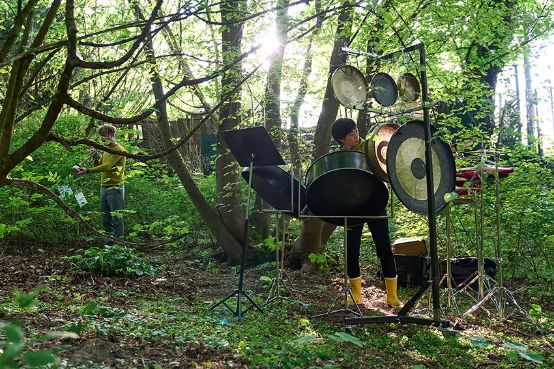Wittener Tage: Brought into the open and to the end
The Wittener Tage für neue Kammermusik in the festival director's farewell year - and with successful Swiss contributions by Lilian Beidler, Daniel Ott and Beat Furrer.

Witten is not beautiful. Witten has the typical appearance of a city in the Ruhr region that was badly destroyed in the Second World War. Rapid reconstruction was the order of the day in the 1950s. Without any consideration for aesthetics or urban planning, an unadorned, straight pedestrian zone was planted in the center, surrounded by new buildings and various industrial halls. But despite all the dreariness: You can find them, the little oases, in this small town of around 100,000 inhabitants. One of these is definitely Witten's Schwesternpark. Since the beginning of the 20th century, this enchanted park has offered nurses relaxation and a piece of home. Here they could stroll along winding paths, lie down on the meadows, play tag, laugh and simply have fun.
Last year, sound installations in Schwesternpark were already on the program of the Wittener Tage für neue Kammermusik. Those were lockdown times and the certainly well-intentioned radio broadcast, including moderation, could only convey a vague impression of what unfolded in all its splendor this time: There are the musicians, who in Daniel Otts Spatial interventions Nurse Park Fragments move freely through the park. They seem to pass the balls to each other, leaving space for silence and sometimes making contact with vocalists scattered around the park.
Voices from the underworld
Ott's colleague, Lilian Beidleralso from Switzerland, is showing her special work called Pleasure roots and dream barkn. As if from nowhere, the audience hears all kinds of insect sounds in the best sunny weather. Surely these could also come live from nature. But when female laughter and giggling can be heard, the audience becomes skeptical. In fact, the voices and sounds are coming from the earth, where Beidler has hidden her loudspeakers under a layer of peat. Born in Bern in 1982, she is obviously imagining the sisters having fun in the park. However, this has not only a humorous, but also a mysterious note. At some point, a deeper "boo hoo" emerges from the loudspeakers: Yes, voices from the underworld.
Farewell to the old master
It is a special "Witten vintage". Harry Vogt directed the festival for 33 years. He moved much of the festival into the great outdoors, sometimes with sensational success, such as Manos Tsangaris' "Audio movie" Swallowwhere musicians played on an excursion boat on the Ruhr. Vogt emphasizes that he wanted to extend the theme of "dialogues" - inscribed in chamber music - to dialogues with nature, but also to an intensified dialogue with performers, which proved to be particularly fruitful. Very good musicians, closeness to the music and a certain (and justified) skepticism towards some fashions were trademarks of the deserving festival director, who is now taking his leave.
Vogt apparently had to wait years for the eagerly awaited premiere of the trio by the now 86-year-old Helmut Lachenmann. Now the three incredibly accomplished string players of Trio Recherche are finally playing the String Trio No. 2. Lachenmann remains true to his aesthetic credo, the definition of "beauty as refusal". Often toneless, the musicians carefully brush the strings with the wood. From the barely audible - but all the more intense - rushing pianissimo come sudden loud attacks in the form of overlapping, dense lines that can hardly be untangled. How fresh and dramaturgically perfect the "old master Lachenmann" still sounds!
Beat Furrer, born in Schaffhausen in 1954, is a constant, recurring Witten guest. According to Furrer in the program book, ideas for his trio have apparently been circulating for twenty years. Now it is simply called into the open and is tailor-made for the Trio Accanto with Markus Weiss (saxophone), Nicolas Hodges (piano) and Christian Dierstein (drums). Furrer starts from a simple unison. The parts become increasingly distant from one another, culminating in a brilliant, almost autistic virtuosity, especially in the saxophone. The compositional craft is also virtuoso. Furrer captures the fraying trio again and again. In the end, after all the distances, it may not sound beautiful, but it sounds coherent - and gives this fantastic farewell to Witten another very special note.








